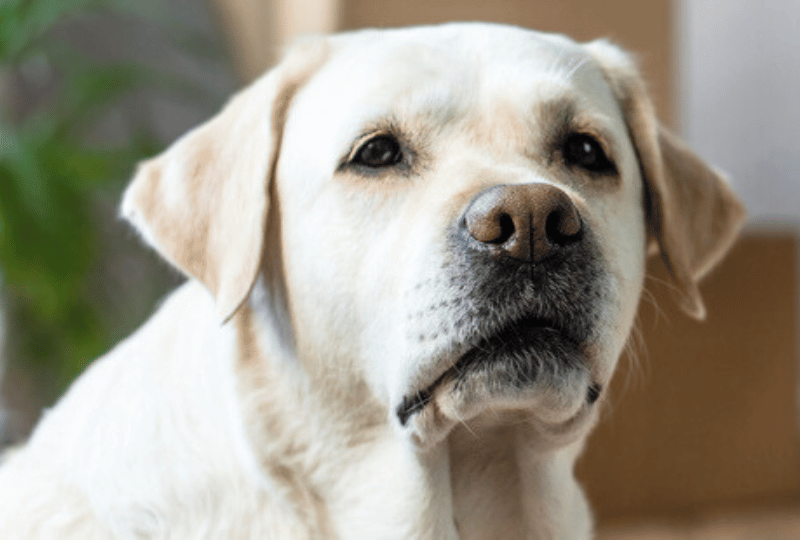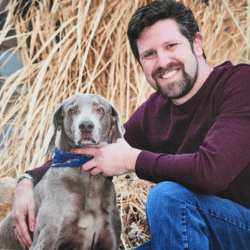Hearing your dog whine is never a pleasant noise, but in the morning it can be downright disruptive. But even if your dog doesn’t disturb your beauty sleep by whining, you may still wonder why they’re whining or if you should be concerned.
I talked with Not A Bully’s veterinary and behavior team and together we came up with the following quick answer:
Dogs often whine in the morning due to basic needs like needing to use the restroom or feeling hungry after a long night. Puppies and older dogs are particularly prone to this. Another common reason is separation anxiety, as dogs may anticipate being left alone when their owners start their day.
Additionally, a change in the usual morning routine can confuse dogs and lead to whining. If the whining becomes excessive or is accompanied by other signs of distress, it could indicate a deeper issue that may require attention, such as health problems or severe anxiety.
To address morning whining, establish a consistent routine for bathroom breaks and feeding times. If separation anxiety is suspected, gradual training to ease the anxiety can be helpful. If the whining persists or worsens, consulting a veterinarian or a professional dog trainer is recommended.
Whether you want to know why your dog is whining so much or simply want it to stop, this article can help you narrow down the cause and learn some tips to prevent future whining.
Reason 1: They Have to Go to The Bathroom
8 hours is a long time to go without using the restroom, especially for a small animal with an even smaller bladder. Whether your dog is explicitly trying to communicate with you or they’re just uncomfortable, whining is a common thing dogs do when they desperately need to go out.
Puppies and elderly dogs can struggle to control their bladders and are especially likely to whine in the morning for this reason. But any dog can only hold their pee for so long, so letting your dog out when they communicate the need to go outside in the morning is critical to their health. Dr. Menicucci adds “Establishing a consistent routine for nighttime and morning bathroom breaks can help minimize this type of whining.”
Reason 2: They’re Hungry
There’s a reason the first thing most of us do in the morning is eat breakfast. After hours of not eating, an empty stomach sends out an army of ghrelin and other hormones to activate the brain’s hunger centers.
All that jargon aside, being hungry is just plain uncomfortable. As we’ve all experienced, the body does a pretty good job of making us want to eat with hunger pains. For some dogs, having an empty stomach for too long can even make them sick.
If your dog is whining in the morning, it could just be a friendly (but annoying) reminder that they’re ready for breakfast. Alternatively, your dog may just be expressing their discomfort or even just be excited to chow down. Either way, a bowl of kibble might do the trick- or at least a treat!
Again, Dr. Menicucci points out the importance of routine, and explains that consistent feeding can “help regulate a dog’s digestive system and reduce morning hunger whining.”
Reason 3: They Have Separation Anxiety
After over 10,000 years of domestication, dogs are essentially wired to want to constantly be by our side. In fact, many scientists believe that humans and dogs share the same sort of relationship as a human mother and child! But for as amazing as friendship can be with our canine friends, this instinct can go too far in many dogs.
Separation anxiety is an unfortunately common stress disorder that is triggered when your dog is left alone. Behavioral signs include barking, scratching the floor or walls, pacing, and a variety of other destructive behaviors. Typically, dogs start doing these behaviors when you leave the house, but in more severe cases your dog may not even be able to handle sleeping in the other room.
Even for the 70% of dogs that sleep in the same room as their owners, separation anxiety may strike from the time of day. Chances are, in the morning you get ready to leave the house, and your dog knows this. Cues such as you eating breakfast or getting your shoes on all reinforce the idea your dog is going to be separated from you soon.
Separation anxiety can show up in a lot of ways from dogs sitting super close to you or laying on your stomach to destroying the house while you’re gone. That can make this problem a little hard to spot and even harder is the fact that you can’t just stay home 24/7 which is why it’s important to address your dog’s anxiety. Later in this article are some tips and tricks to help your dog with separation anxiety.
Reason 4: You Woke Up at a Different Time
It’s Saturday morning. After a full week of work and a long night of binging your favorite show, all you want to do is turn off the alarm clock and sleep in. Unfortunately, your dog has other plans.
They whine. They paw at your shoulders while you sleep. They even bark. It feels like your dog will do anything just to interrupt your sleeping in!
While they may not have puppy planners, dogs are still creatures of habit. Whether you know it or not, your dog probably knows your schedule almost as well as you do. This includes when you wake up, when you leave for work, when they get breakfast, and of course, when you get home.
For dogs that are used to strict routines, any upset or alteration to this routine may cause confusion and anxiety. Major shifts like going on vacation can cause big changes in behavior but even small changes like adjusting the time wake up can be enough to alter behavior and lead to whining. If you have to make a big change to your schedule, Dr. Menicucci suggests gradually shifting the routine over several days rather than abruptly to help reduce the impact on your dog.
This video does a great job highlighting how important time is for dogs and how good they are at actually “telling” time:
Reason 5: You Reward Whining
When our beloved pets start to whine, many of us instinctively go to pet them or comfort them. For as kind of a gesture as this is, it may actually be reinforcing their whining.
Most animals, dogs included, have their behavior modified by operant conditioning. In more simple terms, when they are rewarded for a behavior, dogs engage in it more often. When they are punished for a behavior or do not receive a reward, they engage in it less often.
Pets or cuddles are all excellent rewards for them to keep whining, but some things you may not expect can also reinforce the behavior. You may think fussing at your dog is a punishment, but some early morning attention– even if it’s negative– is welcomed by many dogs.
Reason 6: Your Dog Has Extra Energy.
Is your dog high energy? Some breeds of dogs need daily exercise and if they don’t get it, they might wake up every morning super excited with extra energy to burn. Even though they might be whining out of excitement more than anything, this could definitely be a cause.
Maybe you’re not sure if your dog is high energy. If this is your first dog it’s hard to make a comparison. The American Kennel club provides a list of the 15 most active dog breeds. They list, Corgis, Shetland Sheepdogs, Dalmations, Russel Terriers, Huskies, Golden Retrievers, Labradors, Border Collies, Australian Shepherds, Poodles, Mini Pinschers, Irish Setters, German Shepherd Dogs, English Springer Spaniels, and Beagles.
Even if your dog isn’t on this list they still might be a hyper dog just based on their personality and there are plenty of other breeds like Rottweilers and Pitties that also need tons of exercise. If you find they are more calm and relaxed around the house after a long walk, your dog definitely enjoys activity. When they whine at you in the morning it might be because they are well rested and ready to play!
Keeping our dogs busy in the morning can help to burn off some of the restlessness they may be feeling. Dogs need mental engagement as much as physical exercise and that can be challenging to provide in the early hours of the day when you are rushing off to work.
Creating a schedule of food puzzles, sniffing games, and chew bones can help to provide variety to your dog’s day and relieve the boredom they might be feeling in the morning.
Reason 7: Your Dog Is Just a Puppy.
Combined with all of the reasons above, if your dog is only a puppy, whining is a very normal behavior.
Puppies whine more often than adult dogs because they are learning how to communicate wants and needs. In the same way that a baby cries more than an adult, puppies cry more than dogs.
Puppies have a lot to figure out! Everything from letting you know when they’re hungry to figuring out how to make it through the night without pooping! That means whining is just another thing they could be testing out and understanding.
If your puppy is whining even more in the morning, they are probably practicing their communication with you. For up to two years a dog can still be considered a puppy. So while they are young, be patient with them and look carefully to see what other reasons could be causing them to whine more in the mornings. The puppy years are a great time to establish good routines with your dog so they don’t develop separation anxiety, destructive habits, and so they can learn effective ways to channel their energy.
How to Stop Your Dog From Whining in The Morning
Although it is often a communication tool, it’s understandable if you want to reduce whining in the morning. Even if your sleep isn’t disturbed by frequent whining, it can be annoying or distressing for owners. Thankfully, there are a few ways to reduce or eliminate the behavior.
Figure out Why They’re Whining
It’s pretty hard to help your dog stop whining in the morning if you don’t know why they’re doing it in the first place. Thankfully, most reasons can be figured out with context clues.
Pay attention to what your dog does when you get out of bed. If they rush to the door or appear to be waiting on you, there’s a good chance that the whining is related to having to use the restroom. If they go into the kitchen or wherever their food is, they are likely hungry.
A glance at the clock can also help figure things out. If you’ve lingered in bed a little longer than usual, that may be the “issue.” If all of these options have been crossed out, separation anxiety is a likely cause. This is especially likely if your dog is showing other signs of anxiety, such as:
- panting
- drooling
- pacing
- defecating or urinating in the house
- destructive behaviors such as chewing or digging
Let Them Out Before Bed and When You Wake Up
After waiting eight hours, your dog will obviously have to use the bathroom pretty badly. But by taking your dog out before bed and first thing in the morning, you can make your dog as comfortable as possible and avoid health issues such as bladder stones from holding urine too long.
Set A Feeding Schedule
Separating out our calories throughout the day comes naturally to us humans. But while we get to eat our three daily meals plus snacks, many of our canine friends are only fed once a day.
After spending over twelve hours without eating, your dog’s gut tends to get hyperacidic, causing discomfort and nausea. You would probably feel pretty eager for your next meal if you only had breakfast too!
On the other hand, some dogs are freely fed, grazing throughout the day. On top of being not recommended for most dogs, free feeding up until bed time may cause your dog to go to bed with unfinished business– literally!
A good way to tackle both of these uncomfortable issues and avoid whining in the morning is to give your dog at least two meals a day 8-12 hours apart, with one of these meals being first thing in the morning!
Treat their Anxiety
Separation anxiety in pet dogs can range from mild to severe. For mild cases of separation anxiety, you can try counterconditioning the negative association of you leaving the house by introducing a positive one. For instance, you can give your dog a tasty treat that they only get right before you step out the door.
That said, this may not be enough if your dog has a more severe case of anxiety. In this situation, enlisting the help of a professional is likely the best way to go. Your best bet is to rule out medical concerns first by getting in touch with your veterinarian and then connect with a certified professional dog trainer in your area and behavior consultant for behavior treatment options. I’m a CPDT-KA trainer in Colorado Springs so if you’re in that area feel free to reach out.
Set a (Flexible) Routine
If your dog is crying because you are disrupting their schedule, you can do one of three things: change your behavior to match their expectations, make your dog more flexible, or wait for them to adapt.
For a start, your dog may actually be doing you a favor by not letting you sleep until noon. As nice as it is to sleep in on the weekends, it’s even better not to rack up sleep debt in the first place. While an extra hour here and there isn’t harmful, setting a proper sleep schedule to get enough sleep throughout the week can prevent you from sleeping in an excessive amount of time on the weekends. Sounds like a win-win for you and your dog!
That said, your dog should be adaptable to the occasional change. It’s nice for your dog to know that they can expect a morning walk, but making a morning ceremony of leaving the house or scheduling everything to the dot can be miserable for any dog. Instead, aim for a general schedule incorporating flexibility.
As far as waking up earlier or later due to changes like daylight saving, your dog just needs some time to adjust.
Ignore The Behavior
If you’ve addressed every other possible cause, your dog’s morning whining could be something you’ve unknowingly taught them to do.
It may sound like a pretty scary thing, but when it comes to unwanted behaviors, extinction is welcome! The principle of extinction is pretty straightforward– when a behavior is no longer paired with reinforcement, the association goes away and the behavior decreases.
In simpler terms, if you don’t reward your dog for a behavior, they’ll eventually stop doing it. Although your dog may initially whine more due to an extinction burst, they’ll eventually learn that whining in the morning doesn’t give them anything.
However, Dr. Nita Patel points out that “You should only ignore the whining behavior if you have ruled out any other possible underlying medical condition or need. If your pet is trying to communicate, we would not want to suppress that so make sure you explore all other possibilities first.”
Closing Thoughts
Whining in the morning may be a common behavior for dogs, but that doesn’t mean it should be overlooked. If your dog has a biological function they need attending to in the morning like eating or using the bathroom, whining may act as a tool to get you out of bed just a little bit faster.
But even if it isn’t a cue to let them out or pour out some food, your dog’s morning whining could potentially be an important sign to make some changes in routine or behavior. Often, the best way to keep our canine friends content is to just listen!



